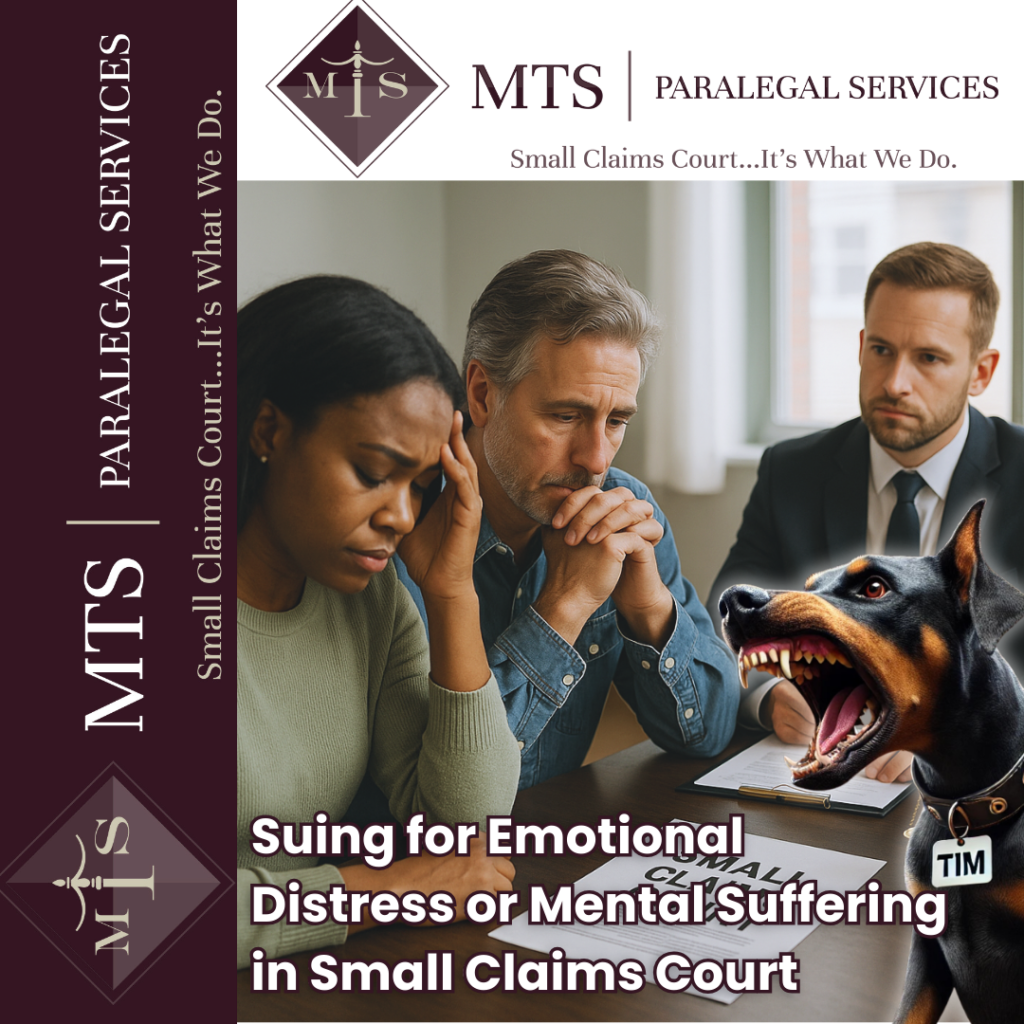
Suing for Emotional Distress or Mental Suffering in Small Claims Court—Is It Possible?
In Ontario, individuals have the right to seek compensation for harm suffered due to the wrongful actions of another. While most people associate Small Claims Court with matters like unpaid debts or property damage, claims involving emotional distress or mental suffering are also possible under specific legal conditions. Tim at MTS Paralegal Services, a licensed and knowledgeable paralegal, has guided numerous clients through Ontario’s Small Claims Court system, including those seeking justice for mental or emotional harm.
Understanding Emotional Distress in a Legal Context
Emotional distress—also known as mental suffering or psychological harm—refers to the psychological impact caused by another person’s intentional or negligent conduct. In Canadian tort law, emotional distress is often linked to claims such as intentional infliction of mental suffering, negligence, or breach of duty.
To establish a valid claim for emotional distress, the plaintiff must demonstrate the following elements:
- The Defendant’s Conduct Was Outrageous or Egregious
The behaviour in question must go beyond ordinary annoyance or upset. The courts require that the conduct be flagrant, extreme, and unacceptable in a civil society and backed by medical documentation. - Intent or Recklessness
The defendant must have intended to cause harm or acted with reckless disregard for the impact of their actions on the plaintiff’s mental health. - A Recognizable Psychiatric Injury
The distress must be medically significant, often requiring a diagnosis from a healthcare professional. Courts typically expect documentation or expert testimony to support such claims.
Can You Sue for Emotional Distress in Small Claims Court?
In Ontario, Small Claims Court handles civil disputes involving monetary claims up to $50,000, following the jurisdictional increase effective October 1, 2025. While claims for emotional distress are typically more complex and often reserved for higher courts, they may be pursued in Small Claims Court under specific circumstances—particularly when the distress results in quantifiable financial loss or accompanies a related legal issue such as personal injury, defamation, or harassment.
However, there are limitations to keep in mind:
- Burden of Proof: Emotional distress claims must be supported with concrete evidence. Vague or subjective feelings of anxiety or upset are insufficient.
- Quantifying Damages: The plaintiff must assign a specific monetary value to their emotional damages. This often involves medical bills, therapy costs, and expert reports.
- Jurisdiction Limits: If the claim is rooted in defamation, discrimination, or constitutional matters, Small Claims Court may not be the proper venue.
Examples of Valid Emotional Distress Claims
A few scenarios where emotional distress might be considered in Small Claims Court include:
- An employer publicly humiliates an employee in front of co-workers, leading to medically documented depression.
- A neighbour engages in targeted and sustained harassment, including verbal abuse and threats, causing the plaintiff emotional trauma.
Tips Before Filing Your Claim
- Gather Medical Evidence: Ensure you have professional documentation from a psychologist, psychiatrist, or therapist.
- Document the Behaviour: Save text messages, emails, witness statements, or recordings that show the defendant’s conduct.
- Consult with a Paralegal: Legal professionals like Tim at MTS Paralegal Services can help you determine if your case meets the threshold and assist with preparing your claim properly.
If you’re unsure whether your situation qualifies, speaking to a licensed paralegal is the best first step.
Need Help?
Claims involving emotional distress are legally complex, and filing without proper support can result in dismissal. At MTS Paralegal Services, Tim is ready to help you assess your situation, prepare your documentation, and represent your interests confidently in Small Claims Court.
Call Tim today at (226) 444-4882 or visit https://mtsparalegalservices.com to schedule your consultation.
This content does not constitute legal advice. For up-to-date guidance or legal advice specific to your situation, please contact MTS Paralegal Services Professional Corporation or call (226) 444-4882.
